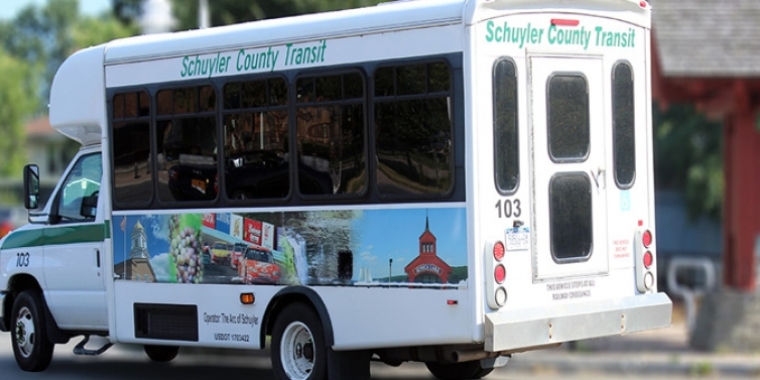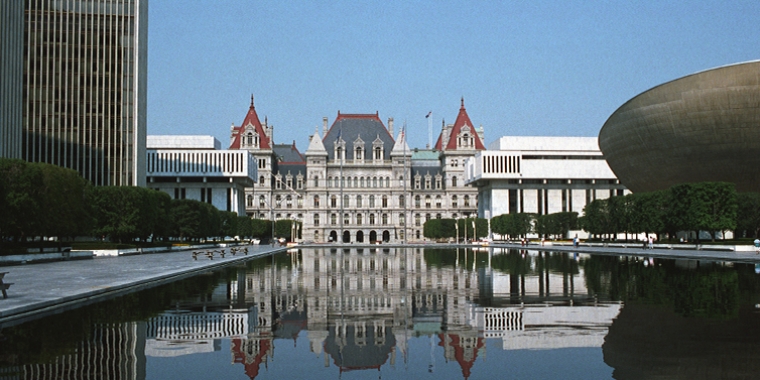
O’Mara: Governor Cuomo's veto keeps Upstate public transit systems at risk
December 1, 2016

Elmira, N.Y., December 1—Legislation sponsored by State Senator Tom O’Mara (R,C,I-Big Flats) to establish a new "Upstate Transit Funding Board" within the state the Department of Transportation (DOT) has been vetoed by Governor Andrew Cuomo.
O’Mara has been at the forefront of this critical issue for the future of rural public transportation. He said that Cuomo’s veto of his legislation (S8045/A8202) keeps thousands of Upstate residents at risk of losing a public transit system they rely on for many necessities.
O’Mara, a member of the Senate Transportation Committee and the Legislature’s joint, bipartisan Commission on Rural Resources, said, “Over the past several years we’ve built a strong case for this action, which has been reflected in the fact that this year it finally received nearly unanimous legislative support. Governor Cuomo’s veto ignores the realities facing the ability of our localities to provide a service our residents absolutely depend on for many necessities. We need to take steps to ensure the long-term operation and viability of public transportation systems throughout the Southern Tier and Finger Lakes regions, and across Upstate New York. For thousands upon thousands of Upstate residents, these systems provide critical links to jobs, medical appointments, school, shopping destinations, and other necessities. Our public transit systems also stand as cornerstones of regional transportation networks vital to economic development, job growth, anti-poverty and housing initiatives, energy and environmental conservation. Governor Cuomo has put this challenge off for another day. That unfairly and unacceptably keeps Upstate public transportation systems at risk.”
The legislation is sponsored in the Assembly by Assemblyman Anthony Brindisi (D-Utica). In June, the measure was unanimously approved in the Senate and by a vote of 134-2 in the Assembly.
O’Mara and other supporters stress that fares alone are not sufficient to cover all the costs of providing public transit services and the systems must rely on annual state funding. He said that this legislation creating an Upstate Transit Funding Board would ensure that discussions remain ongoing to continually identify sustainable funding options to provide for growth and stability in public transportation operating assistance and create additional opportunities for supporting mobility options for Upstate New York residents.
The future of Upstate public transit systems has been an O’Mara priority over the past several years, particularly since the state’s ongoing Medicaid redesign strategy has included a shift over the past three years in the administration and management of Medicaid Non-Emergency Medical Transportation (NEMT) from localities to the state. It’s been viewed as a cost-cutting move by state officials, but a number of local public transportation officials from O’Mara’s district and across the Upstate region have continued to raise concerns about the plan and, especially, its long-term impact on rural communities and populations, including the disabled, elderly and the rural workforce.
“The Medicaid redesign effort in Non-Emergency Medical Transportation has resulted in a significant shift in public transportation services in many areas – from public transit buses to private taxi service -- but especially in rural, Upstate regions,” said O’Mara. “The future of public transportation in our rural, Upstate regions is being put at risk by Albany’s ongoing attempt to impose a statewide, one-size-fits-all approach to these local systems. It remains a developing crisis for many rural residents. So we keep trying to bring more widespread attention to the changes underway, fully assess the consequences for our counties and do what we can to ensure that the impact on rural, Upstate public transportation at least receives a full and a fair hearing.”
Over the past few years, O’Mara has held numerous meetings and forums, including a public roundtable in Cooperstown last July to hear from local officials, mobility managers, transportation providers and community organizations in Upstate rural regions who say that the new, one-size-fits-all approach, which might be workable in suburban and urban areas downstate, isn’t proving cost-effective or efficient in their rural communities. At the forums, officials from numerous counties, including all of the counties O’Mara represents as part of the 58th Senate District (Chemung, Schuyler, Steuben, Tompkins and Yates) have highlighted the shortcomings of the new system, including the elimination of existing transportation routes, the future of locally based cost-efficiency initiatives and the overall disruption of services to persons with disabilities, seniors and other local residents who have long depended on these rural public transportation systems.
Share this Article or Press Release
Newsroom
Go to NewsroomO'Mara, Senate Republicans oppose 'Migrant Tax' on New Yorkers
September 20, 2023

Statement from Senator O'Mara on the 22nd Anniversary of 9/11
September 11, 2023


